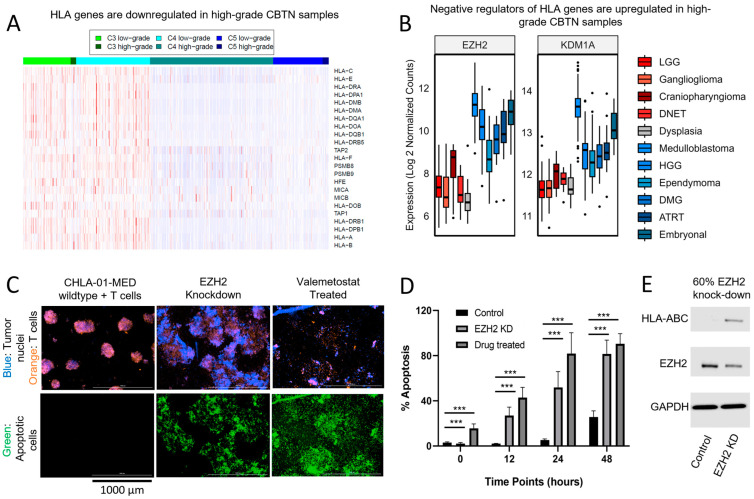Figure 4.
Antigen-presenting genes are downregulated in high-grade pCNS malignancies. Targeting EZH2 increases MHC, enhancing the immunogenicity of a medulloblastoma cell line (CHLA-MED-01). (A) Antigen presentation is critical for the development of anti-tumor immunity. Except for the C5 subtype, where antigen-presenting genes are suppressed across histologic grades, antigen suppression appears to be an additional mechanism of immunosuppression among high-grade tumors, independent of the C3/C4 dichotomy. (B) Two transcription factors implicated in the downregulation of MHC-related genes, EZH2 (ANOVA Tukey HSD p adj < 0.001) and KDM1A (p adj < 0.001), are significantly upregulated in all high-grade lesions relative to samples of cortical dysplasia and similar expression is observed in low-grade lesions (p adj = 0.09 and 0.99, respectively). Sample outliers indicated by dots. In (C), CHLA-01-MED cells (fluorescently indicated in blue) are co-cultured with activated allogeneic donor T-cells (orange), without or with EZH2 suppression. Cells across conditions were imaged with Cytation at various time points, with a 24 h time point represented here. In the presence of EZH2 shRNA or EZH1/2 inhibition with valemetostat, an increase in Caspase-3/7 fluorescence, a marker for apoptosis (green), is observed. (D) Exposed conditions demonstrate an increase in Caspase-3/7 across each time point at 12, 24, and 48 h (two-sided student t-test between treated and controls, where *** = p < 0.001). (E) Activated allogeneic donor T-cells react by recognition of foreign MHC. Here, Western blot with anti-HLA-ABC is performed on wild-type and EZH2 knockdown (60% knockdown via Cytation quantification) samples, demonstrating an increase in HLA protein production in EZH2-targeted CHLA-01-MED. The uncropped bolts are shown in Supplementary Materials.

